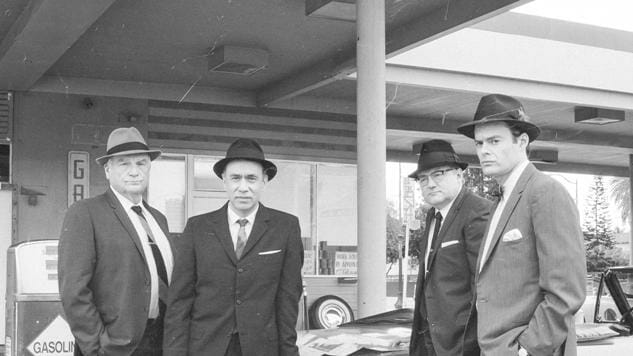Documentary Now Mines Pathos for Laughs With Its Salesman Parody

Documentary Now! dips back into the Maysles brothers’ (Albert and David) well for its latest episode, “Globesman.” After tackling the brothers’ best-known documentary Grey Gardens last season, the IFC series parodies their 1968 film, Salesman. Instead of selling high-end Bibles as in the original, the door-to-door salesmen of Documentary Now! hawk globes (hence the title). Shot in black-and-white, the episode mimics the film in so many ways, faithfully recreating and subtly mocking some of its most famous scenes and characters; but remarkably, it also preserves the melancholy and pathos of the Maysles’ film. It’s an unconventional combination of genres that proves how daring this show can be.
For those not familiar with Salesman, the film follows four Boston Bible peddlers who try to sell expensive Bibles ($49.95 a pop) to middle- and lower-income Catholics, many of whom clearly cannot afford the extravagance. The pitches move between soft and hard sells, with monetary futures of both sides on the line. The Maysles brothers’ cinéma vérité captures a time in America where door-to-door sellers were still accepted as the norm: People answered their doors and let strangers into their homes. It would take a few more decades for Robocall technology to develop (followed in short order by caller ID and Nest products) allowing the average consumer to ignore the phone and front door, respectively.
A precursor to reality TV, Salesman focuses on Paul Brennan (“The Badger”) as he struggles with closing sales against some of the other more aggressive and successful Bible sellers; he’s Willy Loman from Death of a Salesman personified. In “Globesman”, “The Badger” becomes Tom “The Possum” O’Halloran, with Fred Armisen playing his character surprisingly close to the original, successfully conveying the despair and the frustration of a cold streak. He’s joined on the road by three others from Amalgamated Globe, including Pete “The Scrod” Reynolds (Bill Hader); Bob “The Lummox” Campbell (Tony Forsmark); and Mike Stankowitz, aka Mike Stankowitz (Bill Smitrovich). The men have a competitive, yet mostly cordial relationship with each other. They spend hours on the road, in hotel rooms drinking beer and chain smoking in place after place where it’s now illegal or frowned upon (conference rooms, clients homes).
-

-

-

-

-

-

-

-

-

-

-

-

-

-

-

-

-

-

-

-

-

-

-

-

-

-

-

-

-

-

-

-

-

-

-

-

-

-

-

-








































